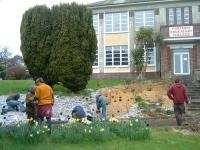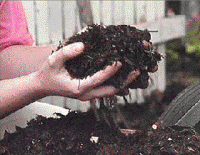5 Jul 2006
Lomborg, Climate Change and Energy Descent.
 **Bjorn Lomborg** is Environmentalist Baiter Supreme, the one guy with some letters after his name who is wheeled out in the media to represent the scientific face of climate denial. Despite having been accused of scientific dishonesty by the Danish Committees on Scientific Dishonesty, he is still out there, touting his free market ideas. This Sunday’s Observer newspaper included an article by Lomborg called Climate change can wait. World health Can’t. In it he argues that “spending the world’s limited resources combating climate change would achieve good, but would cost more than it would achieve. That money could be better spent elsewhere”. Looked at from an energy descent perspective (among others), Lomborg’s arguments are a nonsense.
**Bjorn Lomborg** is Environmentalist Baiter Supreme, the one guy with some letters after his name who is wheeled out in the media to represent the scientific face of climate denial. Despite having been accused of scientific dishonesty by the Danish Committees on Scientific Dishonesty, he is still out there, touting his free market ideas. This Sunday’s Observer newspaper included an article by Lomborg called Climate change can wait. World health Can’t. In it he argues that “spending the world’s limited resources combating climate change would achieve good, but would cost more than it would achieve. That money could be better spent elsewhere”. Looked at from an energy descent perspective (among others), Lomborg’s arguments are a nonsense.
 At the core of his article is the idea that combatting climate change and third world development are mutually exclusive, that there is a conscious choice to be made between one or the other. This is only the case if you want it to be. If your idea of third world development is economic growth, factories, the growth of centralised distribution, supermarkets rather than local markets, agribusiness rather than agriculture and the globalised economy rather than the localised one, then yes, it is a trade off, as all those things are inevitably intensely carbon producing.
At the core of his article is the idea that combatting climate change and third world development are mutually exclusive, that there is a conscious choice to be made between one or the other. This is only the case if you want it to be. If your idea of third world development is economic growth, factories, the growth of centralised distribution, supermarkets rather than local markets, agribusiness rather than agriculture and the globalised economy rather than the localised one, then yes, it is a trade off, as all those things are inevitably intensely carbon producing.
If, instead, we start from the point that peak oil is a reality and that, as the Hirsch Report argues, we need to begin a ‘crash programme’ on the scale of a wartime mobilisation in order to have much chance of a smooth transition over the next 20 years, then really that Western development model is bankrupt. It is based on the idea that business as usual can continue in the West, again a highly dubious concept.
This split was encapsulated for me recently at a talk by a fellow Plymouth University student about carbon offsetting. He works for a body called Moor Trees, based on Dartmoor, who do good work raising money from companies as part of carbon offsetting schemes, and then using that money to plant native trees on Dartmoor.
 Good stuff. Struck me however, that in terms of reducing carbon, it would be far better to plant trees that are productive, thereby saving carbon twice, firstly in terms of locking up carbon (the science on this is still inconclusive) and secondly in terms of displacing food that would otherwise be imported. They should be funding walnut groves, sweet chestnuts in urban parks, orchards, espallier apples in back gardens, local urban agriculture projects, coppice woods for fuel, not just woods for the sake of woods. In permaculture we call it ‘multiple function’, the idea that you get one thing to do as many things as possible.
Good stuff. Struck me however, that in terms of reducing carbon, it would be far better to plant trees that are productive, thereby saving carbon twice, firstly in terms of locking up carbon (the science on this is still inconclusive) and secondly in terms of displacing food that would otherwise be imported. They should be funding walnut groves, sweet chestnuts in urban parks, orchards, espallier apples in back gardens, local urban agriculture projects, coppice woods for fuel, not just woods for the sake of woods. In permaculture we call it ‘multiple function’, the idea that you get one thing to do as many things as possible.
One of the problem with Lomborg’s piece is that it, like the economists it praises, breaks everything down into different parts, so that climate change prevention is seen a separate from access to water and economic development. What we should be doing is working with developing nations to help them become more self reliant and less dependent on the globalised economy, which is itself the main source of carbon emissions, rebuilding their agricultural diversity and resilience and lessening their reliance on international trade in such a way as to lock up carbon. Planting useful trees, using local materials for construction, installing renewable energy systems, growing food nearer to home, all these things reduce carbon emissions, and indeed lock up carbon. In David Holmgren’s Permaculture: Principles and Pathways Beyond Sustainability, he cites P.A. Yeomans, writing that;
>the loss of humus from agricultural soils is as large a contibutor to greenhouse gas emissions as motor cars, and that achievable increases in humus across the world’s farming soils could reasorb the whole of the damaging imbalance of carbon dioxide in the atmosphere.
 In other words, helping other countries to switch from intensive to organic and localised agriculture has multiple benefits. We can garden the planet back to health. It may not deal with the scourge of AIDS, a subject I don’t know enough about to comment usefully, but since when is it a matter of either/or? The arguments above for self reliance apply, of course, equally to the West as to the ‘developing’ nations. If I had $50bn to spend, I would spend it on a combination of weaning developed nations off global trade, rebuilding local economies, local food production and self reliance, and also doing the same in the developing world. This cannot happen overnight, but as Hirsch has argued, it has to start now, and with considerable urgency. $50bn would give a global powerdown a huge kick start….
In other words, helping other countries to switch from intensive to organic and localised agriculture has multiple benefits. We can garden the planet back to health. It may not deal with the scourge of AIDS, a subject I don’t know enough about to comment usefully, but since when is it a matter of either/or? The arguments above for self reliance apply, of course, equally to the West as to the ‘developing’ nations. If I had $50bn to spend, I would spend it on a combination of weaning developed nations off global trade, rebuilding local economies, local food production and self reliance, and also doing the same in the developing world. This cannot happen overnight, but as Hirsch has argued, it has to start now, and with considerable urgency. $50bn would give a global powerdown a huge kick start….
 The other odious thing about Lomborg’s piece is the idea that there is only one measure of wealth and value, and that is money. My sense is that part of the period of transition we are entering into is about finding new ways to value things, new ways of placing value. A local and more self reliant economy has less in the way of measurable economic transactions, and more in terms of bartering, the exchange of things that have little financial value, labour exchange and so on. GDP is a dreadful tool for measuring wealth.
The other odious thing about Lomborg’s piece is the idea that there is only one measure of wealth and value, and that is money. My sense is that part of the period of transition we are entering into is about finding new ways to value things, new ways of placing value. A local and more self reliant economy has less in the way of measurable economic transactions, and more in terms of bartering, the exchange of things that have little financial value, labour exchange and so on. GDP is a dreadful tool for measuring wealth.
Ultimately the question for me is not how we can use the current economic system to sustain a growing economy that throws $50bn (peanuts really, the US has spent over $120bn just maintaining the flow of oil from Iraq) at ‘development issues’, but how we are going to navigate the transition to a lower energy future. Lomborg believes that a better world lies in unbridled capitalism, in free markets, in further pushing Western development models onto developing nations. This approach misses the point. Peak oil will pull the rug from underneath the globalised capitalist model, a model which over the last 50 years has dismantled what local self reliance we had in the West, while doing the same to developing nations, with devastating consequences. We have moved from having diverse, resilient agricultures around the world, a huge diversity of seeds and knowledge, to throwing those systems into the bin, and now, when we really need them they are not there.
 We can, with the application of common sense, ingenuity and permaculture principles, design systems, everywhere in the world, that produce food, lock up carbon, support communities, build local economies and leave a legacy for our children. Lomborg’s assertion that it costs too much to do anything so we ought not to bother is shallow, arrogant and desparately out of touch with those of us actually trying to develop workable solutions that do many things at once. Peak oil challenges us to do more with less, to embrace the reality of our situation with creativity and imagination, and to shift our focus to the local. Business as usual is not an option. Globalisation and free trade economics will not be an option. It is the core thinking behind Lomborg’s piece that is flawed, a more holistic and integrated approach is urgently needed, and it is not one you will find in his article.
We can, with the application of common sense, ingenuity and permaculture principles, design systems, everywhere in the world, that produce food, lock up carbon, support communities, build local economies and leave a legacy for our children. Lomborg’s assertion that it costs too much to do anything so we ought not to bother is shallow, arrogant and desparately out of touch with those of us actually trying to develop workable solutions that do many things at once. Peak oil challenges us to do more with less, to embrace the reality of our situation with creativity and imagination, and to shift our focus to the local. Business as usual is not an option. Globalisation and free trade economics will not be an option. It is the core thinking behind Lomborg’s piece that is flawed, a more holistic and integrated approach is urgently needed, and it is not one you will find in his article.
Ed
5 Jul 4:51pm
Rob,
What is the source for Yeoman’s claim that “the loss of humus from agricultural soils is as large a contibutor to greenhouse gas emissions as motor cars, …”? According to The Woods Hole Research Center land use changes (which includes the burning of trees as well as loss of humus) only accounts for about %25 of the increase in atmospheric CO2 concentrations. That’s still a lot of carbon and should be curbed, but Yeoman’s appears to be overstating the case.
ken
5 Jul 7:09pm
I’m a little skeptical about the idea that we can heal the earth just by permaculture. The idea that just changing our farming techniques will undo decades of CO2 production seems to me just another fantasy about how technology will save us from climate change. While plants do consume CO2, they don’t magically pull the existing CO2 out of every strata of the atmosphere.
The Economists’ assumptions also rely on a lot of far-fetched ideas. They for one assume that the eocnomic costs of global warming will be linear and in proportion to longer summers. It’s not a simple matter of turning up the AC. If, for example, Greenland’s ice reserves melt (which, BTW, they are), that would result in a massive deposit of cold fresh water into the Atlantic, stopping the ocean’s “conveyor belt” that brings Europe its warm weather. I’d like to see some estimates on the economic costs of a European mini-ice-age.
The great bread bowl of the United States — the midwest — is vulnerable. In particular, the western United States do not get very much natural rain. To irrigate the vast fields of farmland, water is redirected great distances from the snowmelt of the Rocky Mountains. Here in Colorado, we’ve been getting progressively less snow each year. What used to be uncommon — summer-time water restrictions — are regular end expected.
Farmers right now in Weld County, Colorado are facing difficult choices because the aquifer they normally use to water their crops is running very low this year. To cooporate with existing water-rights rules, the wells have been cut off and crops are dying. This is happening right now, this summer, and it’s only going to get worse.
We still have a lot of flexability and waste to minimize, of course. Subdivisions are still installed with Kentucky Bluegrass — a non-native plant that requires massive amounts of water. The new homeowners come in, the water restrictions hit around the end of July, and they watch their lawns die. There are far more reasonable native plants that don’t require any watering, but some cities (Highlands Ranch) actually go so far as banning sustainable plants in front lawns.
Mark
6 Jul 11:37am
This for me is the heart of the debate in transition culture, like you say it’s a change of model. The transition will bring a conflict of pardigms between centralised and decentralised power. Today Blair is taking his energy review to cabinet, and i am sure the unerlying reason behind his backing for nuclear power is not anthing to do with it being the best option, instead it’s to do with maintaining a model of centralised and resource hungry control. There is nothing Free about the Free Market, it’s just another form of double think.
Adam F
6 Jul 12:49pm
ken,
I think you skepticism of an magical elixer is a healthy one, although the idea of permaculture as “just another fantasy about how technology will save us” is well off the mark.
permaculture is about using existing resources as productively as possible in a way which enhances the environmental carrying capacity. it does this through simple functional design inspired by nature — to find ways where humans can become a useful part of designed ecosystems. this of course involves lifestyle changes.
that is a long way from a technofix solution!
i would like to see yeoman’s references that said.
Adam
cjohnson
7 Jul 9:25pm
The worst thing we could do is build all of these things to help bring electricity, medical care, industrial food production, and “higher standards of living” to the poor regions of the world, and run it all on COAL (and to a lesser extent, gas).
To generate electricity from coal is expensive, that is, unless you let the sulfur dioxide, mercury, and ash (let alone CO2) waft out of the chimney and into the lungs of the people you are trying to help (like they are doing in China and in 2/3 of U.S. coal units). It is expensive unless you build a cheap plant that runs at 20% efficiency. Never fear, just haul in more coal using a dirty, oil-burning truck! To be economical, coal-fired plants must be large, and that means big, expensive power lines. It also means that there will be someone in control of A LOT of people’s electricity. That can get hairy in the developing world, which doesn’t always have a “Public Utility Commission” to call when the power company fails to deliver.
Some seem to think that solar/wind can’t produce enough power. For one thing, these people don’t need 14 megawatt-hours of electricity per person, per year.
Dave
9 Jul 7:21pm
That’s a nice essay. I see you’re heavily involved in permaculture but be careful about overvaluing it as a solution to the peak oil & climate change mess we’re in. It’s one thing to do. There are many others.
best, Dave (TOD)
Rob
9 Jul 9:32pm
For those asking where Yeomans’ reference about soil formation and climate change comes from, according to the bibliography in Holmgren’s book it is from Yeoman’s book ‘Priority One’, which is available from http://www.yeomansplow.com.au/priority-one.htm. I shall order a copy in order to investigate his claims further. I am slightly perplexed though, as Holmgren’s book came out in 2003, and Yeomans’ was published in 2005. So I imagine Holmgren was referring to an early draft of this, although the 2005 publication is all about soil loss and climate change. If anyone out there has read it (I’m going to order a copy) do share your thoughts on it here.
Life on the pea harvest
22 Jul 2:51pm
Climate change and the future of agriculture
Woh, that was a hot old night! Hi this is Colin at quarter-to-seven on Friday the 21st. Last night was quite steamy as well, and we didn’t get the thunder showers that they forecast us so it looks as though…
Peter Donovan
11 Feb 2:39am
Allan Yeomans’ book PRIORITY ONE is a must read for those already concerned with climate change. It will challenge many conventional assumptions. The portion of extra carbon released from the oxidation of soil organic matter, versus fossil fuel burning, can of course be quibbled over. We don’t have tracers, we can only make estimates. Does anyone know how much fossil fuel has been burned since 1700, or how much organic matter has been lost from soils since that time? But Yeomans is quite right that only the agricultural soils and rangelands have the capacity to sequester significant amounts of carbon at relatively low cost.